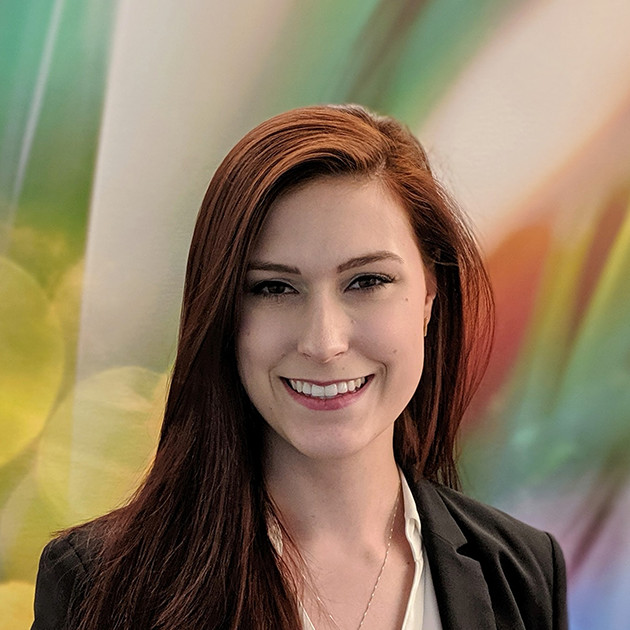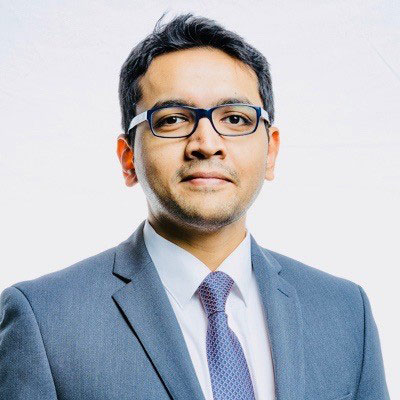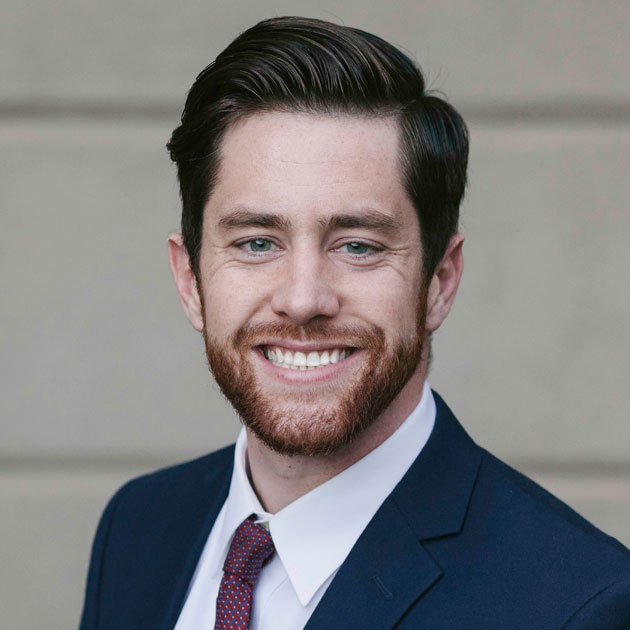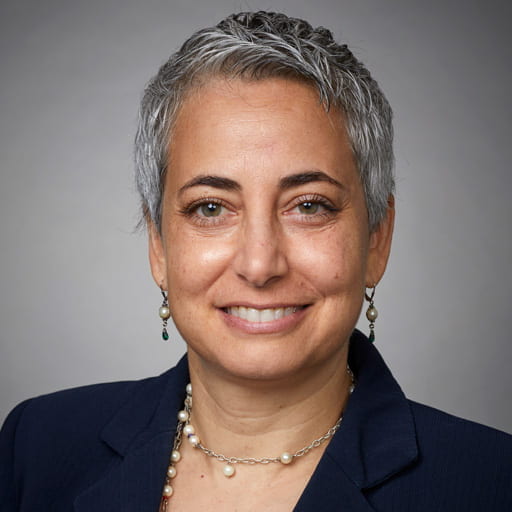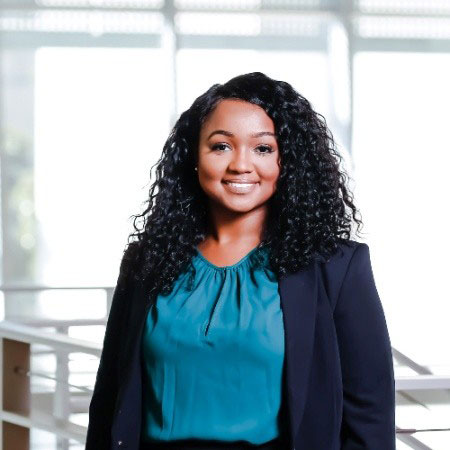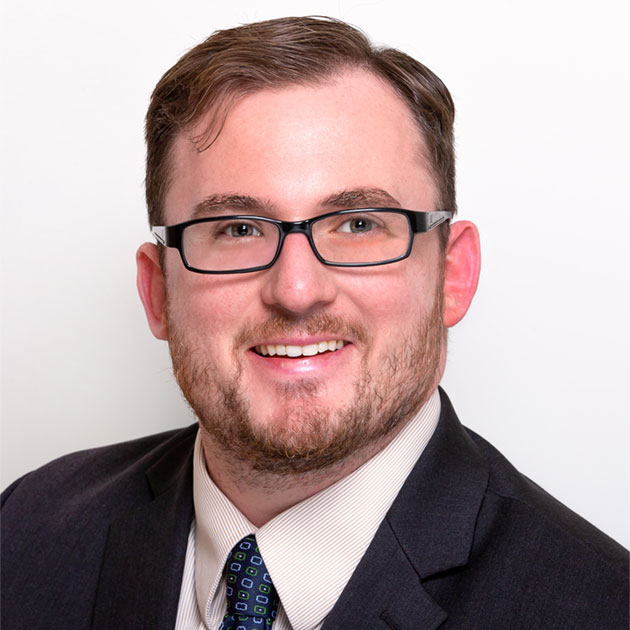
Kevin Winslow, MBA’15, joins Dr. Monica Powell to discuss how obtaining an MBA degree from the Naveen Jindal School of Management at The University of Texas at Dallas gave him a new skill set that allowed him to reimagine his career. The degree allowed Winslow to go from a career in clinical research to one as director of operations at Los Angeles-based Radiology Partners.
Transcript
Introductory music plays up through Monica’s introduction.
[Jimmie] This is yet another MBA G.O.A.T. A podcast featuring conversations with the greatest of all-time MBA alumni from the Naveen Jindal School of Management at the University of Texas at Dallas. We are here to celebrate the outcomes of graduate management education and to identify remarkable examples of how the MBA program here at the Jindal School has transformed the lives of our alumni. Now, here’s Dr. Monica Powell, Senior Associate Dean and Graduate Dean at the Jindal School. Take it away, Monica.
[Monica] Well, hello there, this is Monica Powell. I am the Senior Associate Dean and Graduate Dean here at the Jindal School at UT-Dallas. (The music has continued through this, diminishes and ends.) I am one happy camper today because I’m bringing a Texan back from California to be our featured guest on yet another UT-Dallas MBA G.O.A.T. And, it is my pleasure to welcome Kevin Winslow to the podcast today, who is bringing a very unique perspective given what is happening right now in the COVID-19 world. Kevin is the director of operations for Radiology Partners in California. He resides in Orange County. So, Kevin, welcome to the podcast.
[Kevin] Yeah, glad to be here, very excited to talk with you today.
[Monica] I would imagine since you graduated four and a half years ago and you’re thinking how much time has gone by, does it seem like it was a lifetime ago or does it seem like it was yesterday?
[Kevin] You know it’s one of those weird things where it’s kind of both, where when you think back to the times it seems, ah like it was a lifetime ago, but then it also seems like time has been condensed and some factors since, you know, we’ve been back then. So, a little bit of both.
[Monica] A lot has changed in the four and a half years since you graduated in December of 2015 and we’re living in a really extraordinary time.
[Kevin] mm hmm
[Monica] Ah, you know, Covid-19 has changed every aspect of our existence, and so I’m really curious because you’re one of our G.O.A.T.s that came out of an undergraduate degree in psychology.
[Kevin] Mm hmm.
[Monica] At Texas State and then decided to get into some part of health care. Then thought, “Okay, I’m gonna go get an MBA.” So, you are, you are mired deeply in the health care world.
[Kevin] Yup.
[Monica] So, I’m curious from somebody who has that, um, that job and working in that industry, how is having an MBA been especially important and resourceful to you in this crazy COVID-19 world in which we exist?
[Kevin] Yeah, it, it has been very interesting and especially, you know, kind of being on the front lines of health care operations. The COVID-19 crisis has been very real to me and my firm as, as it has been, I’m sure to pretty much anybody. Um, but, I think what’s been most helpful about having an MBA and where I’ve been able to provide value to my company and, and sort of to my colleagues is getting an MBA teaches you a certain type of problem solving. Ah, you know, I think back to like the case studies and case competitions that I did during the MBA. And, you know, that is a certain muscle that you need to you know exercise to take disaggregated data where you don’t really know like what is important and what is not and to be able to structure it in a way. Ah, that it’s a problem that you can actually you know solve. And, you know, some examples of this type of thing that, you know, I’ve been thinking through in dealing with, with my company over the last few months have been, you know, whether to open or close centers or you know, whether or not to furlough employees and that sort of thing, and so having an MBA I think that was my first introduction to sort of a certain type of problem solving that is, you know, very relevant to kind of the business world you know and the clinical world.
[Monica] So, Kevin it’s really interesting that you used the physiological term muscle and that getting an MBA is exercising a muscle.
[Kevin] Sure.
[Monica] You know, when we’ve all been dealing with this COVID-19 situation, I think the most stressful part of it is dealing with the uncertainty of information, the uncertainty of what’s going to happen, the uncertainty of and nervousness of your employees, the uncertainty of your patients in, in, ah, being in the medical field you know, doing what you do day in and day out, and I believe you’re the director of operations for Radiology Partners.
[Kevin] Correct.
[Monica] And you’re, you’re located California.
[Kevin] Correct.
[Monica] How is that uncertainty? How is having gotten an MBA helping you with managing uncertainty when you literally are not certain about anything?
[Kevin] So, it’s about really being able to focus in on what is important like what are the levers that you can actually impact? And, you know, what are the potential outcomes of different scenarios? So, you know in, in this, you know, COVID-19 crisis in particular where in many cases literally dealing with like life and death. So, yeah, I think we try to err on the sense of you know what’s best for patients and the employees and you know the actual people involved and then kind of consider the business implications, you know later and just try and factor in and understand what those are, are, but, so, I think that, you know, having the MBA teaches you how to kind of structure your thinking and, ah, develop like a decision tree around a, a problem to be able to know, you know, what are the really critical levers that I can pull and you know, what can I and not impact and what are the things that are outside of my control and then helping to understand what the potential implications and impacts of pulling the levers that we can pull are.
[Monica] You know, that’s, that’s really interesting. You know, in the last couple of months and, I think that many organizations have been working remotely now for 10 weeks, if not more.
[Kevin] Mm hmm,
[Monica] Ah, is there a specific MBA nugget of information, a specific MBA case, a specific MBA experience that you’ve gone back to in the last 10 weeks where you’re like, you know, I never really thought I was gonna use that nugget, but, “Oh my gosh, I’m using that nugget now?”
[Kevin] Yeah, I think, maybe two things. So, number one, and it’s not really a nugget, but just I, I remember saying to my wife a couple weeks into this whole crisis, you know when things have stabilized a little bit, but, ah, you know there’s still, I mean, even today you know here, we’re three months or four months into the COVID-19 crisis, and we still there’s a lot of uncertainty, but I remember saying to my wife just like, “I feel like I’m in a case study.” Like, this feels like you know, Kevin sits in his room and looks out the window and tries to think through all these things and you know, what should he do because you don’t have like kind of complete information in a case study with. That’s the point. You have to structure it and understand what’s relevant. So, that’s one. And then, the other thing, ah, would be, I took a class with ah Dr. David Springate on restructuring, and, ah I forget exactly what the title is, but it was about like distressed companies and turn around and restructuring and that sort of thing. And, when all of the COVID-19 stuff hit from a business standpoint, we really focused on cash flow and you know, what’s our cash position, what’s our cash burn rate and you know, I think this is any company right now. So it’s a little bit of a different, like, financial tracking model then you know you typically look at with like reporting revenues and expenses and that sort of thing. It was really important to understand our cash position and what our operating expenses are, and you know just make sure as we don’t have certainty about what’s going to happen that we are in a good position.
[Monica] Well, I’m, I’m really glad. I mean I think it’s a great thing to be able to say that an MBA prepares people for the worst scenario of uncertainty and that is an incredible value proposition when you think about the return on investment for an MBA. I remember, Kevin, when you were coming into the MBA program. You’d had, ah, you know a couple of jobs: a senior laboratory technician job and a senior coordinator of research data.
[Kevin] Mm hmmm.
[Monica] Ah type of job. I think those were both at MD Anderson, and then suddenly, you know this young male with, ah, I don’t even remember if when you were considering it you were yet married. I do not remember that at the time. But what motivated you? I mean you, you had the psychology undergraduate degree. You were obviously going into the area of health care. What motivated you to go get an MBA? And then, so, you had some expectations going in, but where those expectations met? And, what things came that you just didn’t expect? And, how is the return on the investment really paid off for you?
[Kevin] Sure yeah, that’s a great question. So, I think I’d have to take it back because, yah explaining some of those, you know, bullet points of, you know, the time at MD Anderson and the psychology degree. I always wanted to do something with my working life that would be you know kind of positively impactful to society and so, when I was an undergrad I, I got really interested in medicine and, ah, specifically neuroscience, which is why I got the psych degree. But, when I graduated, I wasn’t ready to pull the trigger on going to medical school or a PhD program. So, I took some time and did clinical research. Yes, at MD Anderson Cancer Center. And it was through a mentorship program there that I really got interested in some of the big issues and sort of problems on the administrative and sort of business side of healthcare and that really piques my interest in business. So, that drove me to go back and actually get an MBA instead of like a medical doctorate or a PhD. And, I think going into it, you know my expectation, there was a lot of uncertainty just about ah what, you know, what does this look like on the other end? Like I know what I think, you know, I read these stories about people and their outcomes and you know, I want those things and it seems like this is the right step to take to achieve those things, but you just don’t know. I mean it’s, ah, it’s that, and that’s life. I mean you don’t always know where a certain path is going to lead and so you know I think to answer the other piece of your question. Yes, I definitely, ah, have been very satisfied with the outcome and, and I think when I left the program, I went into a, um, administrative residency effectively at a large for-profit healthcare company. And, you know kind of had a path and vision there, but you know life impacts that path along the way and ah, you know, positively. And I think the MBA has put me in a position where you know I feel very capable and successful in terms of, ah, being able, to, you know, grab the types of goals and things that I’ve set for myself.
[Monica] Do you remember evaluating MBA programs and how you got to us? What made coming to the MBA program at the Jindal School such a unique choice for you? And what really made that the right choice because you have been profoundly affected by the MBA. If anybody were to glance at your Linked-In profile, they would see that, you know, you have advanced yourself up in an amazing way in the, in 4.5 years. You have transformed your life and your family’s life in 4.5 years. But, how did you go about picking us? How did you go about deciding that this was where I can make things happen?
[Kevin] Yeah I, yeah I applied to several different schools and was you know kinda interested in a few. I did lots of internet research and, and you know there were a few things that kind of mattered to me at the time and to for making that decision. One was geography. Ah, I was married, you know, when I came to the MBA and we found out literally like 2 weeks after I accepted the position at UTD that my wife was pregnant with our first child. So, we wanted to stay in Texas at the time which is ironic that then we moved to Southern California after the MBA. Ah, so, that was one thing. So, my top schools were all in Texas and then, you know, definitely, ah, like the, ah, quality of the program as judged by rankings and you know that sort of thing was important. So I wanted to go to the best school possible. Ah, but, then also you know class size mattered to me and there, you know, are some great MBA programs where you’re one of 800 students or you know 200 even which you know I wanted something a little more intimate. And then as well, I wanted something where I could really, like, get involved and kind of have an impact and you know there are programs that have been around for a long time where they kind of just do their thing and you get you know the stamps that you went through the program, but you don’t really get some mold it and have an impact on it and that was something that I, ah, really felt like UTD had that was unique of the programs, ah, that I looked at. And then the final factor was just culture. You know I felt like there’s such a culture at the UTD MBA program of just intellectual openness and collaboration and, ah, acceptance. And. I mean, I’ll say it, a little “nerdiness” (music begins) that really, you know, vibed well with me.
[Monica] So, when the glove fits you gotta wear it, right?
[Kevin] Yes, exactly.
[Monica] I was trying to make a reference to medical glove there, as opposed to other gloves.
[Jimmie] This episode is brought to you by the UT Dallas MBA program, top-ranked nationally and in Texas. The UT Dallas MBA combines a robust core with 13 concentrations. You have an option to add a second Master’s degree and your choices for that include five STEM designated programs. The MBA program has fulltime, part-time, online and other formats. They give you flexibility to fit your MBA education into your busy schedule. The skills and training you will receive are what top employers are looking for. For more information, visit us online at jindal.utdallas.edu/mba
[Monica] You know it’s interesting when you were a student in the MBA program, I don’t know if, if this is true, so, you have to correct me if I’m wrong, but you were, you were active in the health care management association as an officer in that. (Music has diminished and stopped.)That was a newly formed student organization. And so, how did the involvement outside of the classroom impact you? I mean, you were everything healthcare. You came in healthcare. You were engaged healthcare. You did competitions and case competitions healthcare. You were an officer of the healthcare association. So, how did that poster outside of class engagement really benefit you?
[Kevin] Yes, I did get involved in a lot of different health care things, but I also with my course, selection tried to be more general. So, I did a lot of strategy and finance, ah, kind of courses because I felt like that’s where my kind of weakness areas were. But, in terms of the sort of extracurricular involvement I, I think it was really critical for building my network. Like, I got to meet and work with folks, you know, even outside of the MBA program or outside of um, ah outside of UTD. Ah, like we did one case competition that had medical students from UT-Southwestern and a public health student, ah, as well and you know, other students. And then, you get to go to the actual case competition and, ah, meet people from other schools ah as well as than companies and things like that. So, it was really critical in that sense. And, I think the other factor for me just in a personal development area is I’m, I’m pretty naturally shy and I think having to engage and sort of put myself in these uncomfortable positions where you know you’re doing a case competition, and the people you’re presenting to are you know the UN person from Honduras and, and that sort of thing. And you’re meeting new people all the time. It was really great for my personal development.
[Monica] You know, that’s one of the things that I absolutely love. When I think about your transition in the program, I think, you know, when you came to lead camp before classes started, and you were a bit of a, of a shy, introverted guy. But, by the time you got near the end of the program, and I vividly remember having lunch with you somewhere in Paris. Ah I …
[Kevin] Yeah.
[Monica] Ah, we might have been at the Eiffel Tower or a building that looked out at the Eiffel Tower. And I remember we were chatting about your classmates and their experiences on this international trip. And I felt like I was, you know, chatting with a grown up. You know, (she lightly laughs) somebody who, who exceeded me in age. And (Kevin chuckles.) you know, it, it was a very memorable conversation, and I and I haven’t forgotten that. So, I’m kind of curious, what are those moments in the program where you’re just never going to forget it? Where …
[Kevin] Mmm …
[Monica] There was a moment of either reflection or transformation or you know outrageous laughter (Kevin softly laughs.) or you know what were those, those peak moments?
[Kevin] So, lead camp is definitely one just because that is an experience unlike, you know, any other that I can think of in my life in terms of just the intensity of it and the the newness and the excitement and that sort of thing. So, you know coming in day one and you’ve got all these expectations and, ah, excitement about what’s about to happen and you’re super excited to meet your classmates because you’ve read the statistics about what the people in this program are like. And (he laughs a little) you feel lucky to be there and, ah, meet these folks. So, that, that was very cool and memorable. And then I think, as well, some of the case competitions I did ah, like I alluded to it a little earlier, but I did one that was health care focused, ah, where we went to Atlanta to Emory. And ah it was a group. I was the MBA student, but there were, ah, medical students and public health students from other UT schools and then we were competing against teams, from, you know, Harvard and all these other Johns Hopkins, you know super famous, ah high-level schools. And just the panelists were like, you know, the UN representatives from Honduras was there, and somebody from high up I believe in like the FBI or something. So you know, it was just, ah, intense experience where you really bond with some folks. So, that was another. And then I think just some of the, like, memories I have of you know, they put us in the well first semester, I don’t know if it still works this way, but you have your study group which is assigned by the program, ah, and a lot of thought goes into that. And then second semester, you kind of make your own study group. But some of the late nights, you know, working through cases when the study team definitely stick in my memory.
[Monica] So, I’m, I’m kind of curious, I’m gonna do some rapid-fire questions at you and just give me top-of-mind answers. How many cups of coffee do you think you drank during the MBA program?
[Kevin] Per day?
[Monica] Per day.
[Kevin] Ah, four.
[Monica] Woe.
[Kevin] Well, remember I had a newborn, too, so.
[Monica] Oh, that’s right, so this explains everything. Um, what was your go to comfort food as an MBA student?
[Kevin] Mmm, hmm, probably Tex/Mex, which is something I super miss now that I’m not in Texas anymore. Love some good Tex/Mex.
[Monica] Well good; what is the class that you hated to love?
[Kevin] That I hated to love. Hmm, Yeah, I took a class on energy finance with Dr. Anastasia Shcherbakova, and I was just interested in the topic, um but it, it ended up, I mean it’s obviously very complex and challenging, but you know I’m really glad I took that, even though it’s not directly related to anything I do now. I think it was a great, ah, very interesting subject.
[Monica] What was a characteristic, do you think, changed the most in the MBA experience? Was it going from introverted to being more comfortable being extroverted? Or was it a confidence factor? Or what, what was modified the most?
[Kevin] Definitely, confidence, ah, definitely pre-MBA would not have been comfortable doing the things I was doing immediately after the MBA. And then, of course, all that experience builds on itself. Ah, so, I think that’s one. And then, I think just sort of the structured problem solving, ah, like I mentioned a little while earlier about you know being able to kind of disaggregate a problem and then figure out which pieces matter and put it back together in a way that gives you a solution.
[Monica] So, I imagine, Kevin, in your world, you interface with, ah, you know a lot of people that are looking to you as a, a role model or a mentor. What is your advice to somebody who’s considering an MBA? This is an unusual time. We are living in…
[Kevin] Mm hmm.
[Monica] An extraordinary situation with COVID-19. What would you say to indicate the return on investment for an MBA?
[Kevin] Sure, I think that’s a great question. I think it really depends on what that person is looking for. So, I think, if you are just not sure what to do and think this might be a good way to figure that out, I don’t know if that’s the right, you know, answer. I would definitely, I would wait on that one. If you’re in a position where you’re in a company and you really just want to kind of get to the next level within that company, I think an MBA is a great solution. But, if it’s really more about just getting that piece of paper, I think doing something like an online program or something makes total sense. For a in-person experience like what I went through with, you know, UT Dallas, I think that is for the person who really has kind of a goal that is beyond their reach right now, and it’s maybe sort of a transformational goal. Yeah, so for me, I wanted to go from sort of doing clinical research to more of running the business and strategy and operations components of health care organizations. And you know that line, there’s not a direct linear relationship between clinical research and that goal, so, I think for something more transformational and aspirational like that, as long as you have a good sense of that. I think, ah, like a fulltime MBA would be ideal for that.
[Monica] Um, I have a couple more really important questions because you were all about Texas when you were in the program.
[Kevin] Yeah.
[Monica] No doubt about it; all about Texas. And now you are in California. I don’t know if you’re in the bay area or Los Angeles area. Where are you?
[Kevin] So, I work out of Los Angeles. I live in Orange County.
[Monica] Okay, wow in a highly populated area, so, we have a number of alums who have graduated from the MBA program that are in Southern California. Ah yourself included. What do you tell that individual who has no clue what UT Dallas is? And they’re asking you about the University of Texas at Dallas, you got an MBA at the University of Texas at Dallas? What is, what is that phrase you say to them about what UT Dallas and the Jindal School of Management is about?
[Kevin] Sure, so, it’s funny. Actually, it’s been a while since I’ve gotten, you know, questions which maybe either means, ah, people are becoming more aware of UT Dallas or, um, you know I’m not sure what the, ah, right answer is there. But, you know, I think, I say, I mean it’s a top, consistently ranked in the top 50 programs in the world, ah, and you know certainly in the United States over the last decade or so. Ah, it’s a small intimate cohort of very highly qualified people that get in, you know the kinds of the full-time cohort. I think that’s a, a very select group of individuals. Ah, it’s an accelerated program or you know, at least the one that I went through, you don’t have to do it that way I suppose, but, it, the one that I went through was ah three semesters, so it’s a little bit of a condensed program. But, I think in a nut shell just a, a high-quality, great experience.
[Monica] And we and we kicked your butt, right?
[Kevin] Yeah, which is, you know, I think that was one of the other things I was thinking about today is that. Ah, as I was thinking about this, ah, conversation. You know doing the jobs that I did before my MBA, you never have like that moment, or I never did, where I was, you know, working on a problem at like 10:00 or 11:00 at night or like working with a team like in kind of that, um, super intense focused mode, which I got through the MBA. And then I subsequently went into, like, consulting and in other areas and then, of course, now, this COVID-19 crisis, ah, where you know that experience of, you know, being able to kind of focus and work at a level of intensity that I think, you know, doesn’t occur in a lot of work places or companies or roles, um, was definitely a good outcome for me.
[Monica] Yeah, we prepared you for COVID-19. I would just like to state that for the record. So, when the economy is challenged …
[Kevin] Mm hmm.
[Monica] When and, and the global economy has never experienced a COVID-19 and it’s certainly our hope and prayer that we’re never gonna experience this again, but why might it make sense for an individual who finds themselves upside down in terms of their, ah, their career may, maybe they’ve gotten laid off or they’ve been furloughed why would getting an MBA at a time like this make a difference for them from your vantage point?
[Kevin] Yeah, I think even though there’s a lot of negative things going on with COVID and the crisis we’re experiencing right now, I think the smart individual has to see what the opportunity in all of this is and if that means that kind of your life took an unexpected turn and you have some down time ah or maybe a career disruption that you weren’t expecting, I think this is a chance to kind of reimagine what your future could be. And I think in terms of what’s going to be of value as we rebuild this economy and figure out what the new normal is going to be ah moving forward through the rest of COVID and beyond. Ah, the skills that an MBA teaches are extremely valuable and ah, you know going to be desired by any company out there. So, I think there’s a, there’s a huge opportunity for sort of reinvention and you know if you found yourself in a situation where ah your skill set left you at a disadvantage in this kind of environment, you know, than get in your skill set that doesn’t leave you in a disadvantage would be my thought.
[Monica] I think that’s great advice. I really love what you said, Kevin, in, in using the phrase reimagined. Because the, the MBA experience definitely reengineered you.
[Kevin] Mm hmm.
[Monica] And the trajectory of your career. And um, the impact can be very profound if you embrace it and if you let yourself look at what all the possibilities are. In, in the time since you graduated four and a half years ago, you had four or five major progressive moves in your career
[Kevin] Mm hmm.
[Monica] And, um, as much as I would like to give you full credit for that, ah UT Dallas is going to take some of the credit for that. Um …
[Kevin] Sure.
[Monica] So …
[Kevin] Rightly for so.
[Monica] We want to congratulate you for the G.O.A.T. that you have become. And I’ll give you the last parting phrase on what would, what would you tell all of those new incoming MBA students this fall.
[Kevin] Mmm.
[Monica] About how the MBA program can help them reimagine their futures?
[Kevin] I think it would just be to be open minded, even if you have kind of a very specific goal in mind. I think you don’t know what you don’t know yet and the program is going to show you what you didn’t know, so be open minded. Ah, have fun, because it is a very fun experience. Ah, and just buckle up because there’s a lot of work ahead. (He laughs.)
[Monica] Well, I think the work absolutely served you and your family really well, Kevin. It’s been a delight to have you on yet another MBA G.O.A.T. There’s no doubt in my mind, you’re one of those MBAs I’m so very proud of. I don’t get to work as closely with the MBA students today as I did in your era. I miss getting to know students and to watch them really evolve and just do something remarkable (music begins softly) in their lives. Congrats to you and your young family, to you and your progressive career. We hope that you will continue to stay in touch with us even though you moved away to California. We hope you’ll come home soon and come back to UT Dallas.
[Kevin] For sure, thank you very much Monica. It’s been great talking with you.
[Monica] Thank you so much for listening to today’s podcast I hope that you were inspired by the words you heard from one of our Greatest Of all Times MBA G.O.A.T.s . If you were inspired to think about getting an MBA degree, I hope that you will be in touch with us. Give us a call, drop us an e-mail, hop on our website. Be in touch with us so that we can help you make a difference in your future. We look forward to hearing from you.
[Jimmie] Thanks for listening to this episode of yet another MBA G.O.A.T. podcast. Join us online at mbagoat.com to find episode notes, links and more. Be sure to subscribe to yet another MBA G.O.A.T. podcast on Apple podcast or your favorite podcasting app. If you like what you hear, please leave us a five-star review. That will help spread the word about the podcast and Jindal School’s MBA programs. To learn more about the Jindal School’s MBA program, go to jindal.utdallas.edu/mba. (Music continues.

